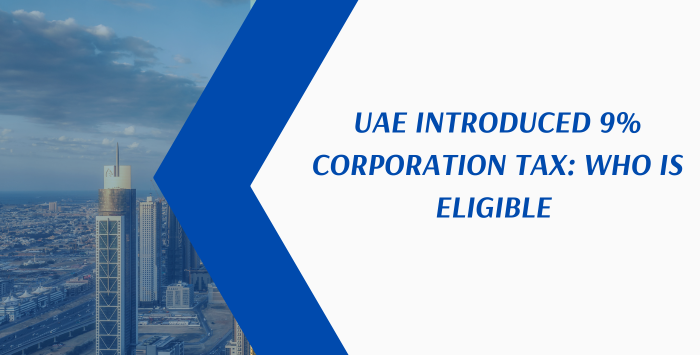UAE Introduced 9% Corporation Tax: Who Is Eligible?

Introduction:
In a significant development, the United Arab Emirates (UAE) has officially launched a regional tax for corporations, marking a historic milestone for the country. Effective from June 1, 2023, the new tax regime implemented by the Federal Tax Authority and Ministry of Finance brings a 9% corporation tax for eligible businesses. This article aims to provide a concise overview of the eligibility criteria for this tax, helping UAE business owners navigate the changes and understand their obligations.
Key Points:
- Mandatory Registration for All UAE Businesses:
- All UAE businesses, including those operating in Free Zones and onshore, are required to register for corporation tax. Even qualifying companies that currently enjoy a 0% tax rate must submit their accounts to the regulator. Failure to register can result in fines or other penalties.
- 9% Corporation Tax for Onshore UAE Entities:
- Onshore UAE entities will be subject to a 9% corporation tax on income exceeding AED 375,000.
- Exceptions for Free Zones:
- Free zones engaged in transactions solely with other free zones or international offshore entities will be exempt from the 9% corporation tax.
- Tax Implications for Free Zones Dealing with Onshore UAE Entities:
- Free zones that conduct transactions with onshore UAE entities will be subject to the 9% corporation tax, unless they qualify for the exemptions mentioned below.
- Qualifying Activities with 0% Tax:
- Certain activities conducted in UAE Free Zones are eligible for a 0% tax rate. These include manufacturing of goods or materials, processing of goods or materials, holding of shares and other securities, ownership, management, and operation of ships, reinsurance services, fund management services regulated by UAE authorities, wealth and investment management services regulated by UAE authorities, headquarters services to related parties, treasury and financing services to related parties, financing and leasing of aircraft, logistics services, distribution in or from a designated zone meeting relevant conditions, and ancillary activities to the aforementioned.
Conclusion:
The implementation of a 9% corporation tax in the UAE marks a significant step towards fiscal reform. UAE business owners, regardless of their Free Zone or onshore status, must adhere to the new tax regulations and ensure proper compliance. It is recommended that all companies familiarize themselves with the specific details of the tax regime, including tax rates, deductions, and compliance requirements. By staying informed and adapting to these changes, businesses can navigate the tax landscape with confidence and avoid potential penalties.

